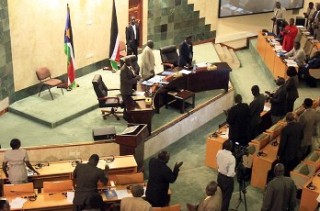S. Sudan parliament convenes special session over constitutional amendments
February 19, 2015 (JUBA) – South Sudan’s parliament convened a special session on Thursday to receive a bill proposed by the cabinet to amend the transitional constitution and extend the mandate of the government until 2017.

According to Wanawila, the proposed bill seeks to retain the legitimacy of the current government when its term expires in July this year.
Parliamentary speaker, Magok Rundial commended the bill and referred it to the specialised committee for justice and legal affairs for scrutiny.
“The committee will report to the house after one month,” Rundial said on Thursday.
“The proposed clause in the bill will be examined one by one and step and by step so that proper interpretation and amendment is made in the constitution,” he added.
The proposed amendment was passed by the council of ministers last week.
“The bill is drafted in accordance with powers vested in the president under article 101 (f), the powers vested in the National Legislature under article 55 (3,a) and article 199 of the transitional constitution, 2011,” the justice ministers further told lawmakers.
According to Article 55(3)(a) of the Transitional Constitution, “the national legislature shall pass amendments to the constitution.” Article 199 says “the constitution shall not be amended unless the proposed amendment is approved by two-thirds of all members of each House of National Legislature sitting separately and only after the introduction of the draft amendment at least one month prior to the deliberation.”
Onyoti Adigo, the leader of minority SPLM for Democratic Change (SPLM-DC) party said the government should have involved the opposition politicians for the dialogue.
“We are saying that that this will be one-sided amendment by SPLM party with it their political party affiliations,” he said, referring to opposition parties holding cabinet posts.
Adigo described as “parasites” opposition parties that do not oppose SPLM decisions.
“Because the constitution is very clear. Article 3(1) says this transitional constitution that the constitution is driven from the will of the people. Not from the will of a particular political party,” Adigo told reporters at parliament.
Currently, South Sudan’s ruling party (SPLM) have an overwhelming majority in parliament and are expected to easily obtain votes needed to pass the amendment.
The tenure of the National Constitution Review Commission, which expired on December 31st, 2014, will also be extended until the end of 2016, according to the amendment bill.
Lawmakers resumed their recess, which ends in April after the speaker adjourned the sitting for 30 days to allow the specialised legal committee to study the amendment.
(ST)
